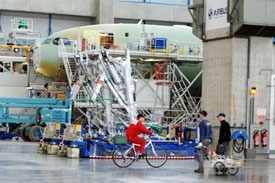Airbus says it beats crisis cost-cutting targets
 Senior director Fabrice Bregier told the Les Echos newspaper that "the targets have been well exceeded", and that the so-called Power 8 programme had enabled the company to save "2.5 billion euros ($3.65 billion), which means as much extra profit, and 10 billion euros in cash."
Senior director Fabrice Bregier told the Les Echos newspaper that "the targets have been well exceeded", and that the so-called Power 8 programme had enabled the company to save "2.5 billion euros ($3.65 billion), which means as much extra profit, and 10 billion euros in cash."
The company expected to employ an extra 3,000 people this year.
Airbus, a subsidiary of the European aerospace giant EADS, had intended to save 2.2 billion euros and 5.0 billion euros in cash.
The company was thrown into a severe crisis by delays in the manufacture and delivery of its superjumbo A380 airliner. These delays revealed far deeper problems concerning strains between France and Germany in the boardroom and in the industrial structure of the group.
Bregier said that the Power 8 programme was intended to transform Airbus from being a "constellation of national entities gravitating around a central function" into "an integrated business."
Although the profitability of the group remained weak, with a net margin of about 1.2 per cent in 2010, "Power 8 has enabled us to remain competitive, despite a euro which has risen from $1.08 to a euro in 2006 to $1.30-$1.40 today."
Whenever the dollar fell by 30 cents against the euro, the cost to the group amounted to about 3.0 billion euros in terms of operating profit.
Of a total of 10,000 jobs due to have been cut under the Power 8 plan, 7,900 had been shed.
Meanwhile, to cope with the launch of the A350 airliner and an increase in the rate of production, the group had hired 2,200 people in 2010, of whom half had been recruited in France, and it planned to take on 3,000 more this year in the fields of engineering, he said.
What the stars mean:
★ Poor ★ ★ Promising ★★★ Good ★★★★ Very good ★★★★★ Exceptional
 Tag:
Tag:
Related Contents
Latest News
More News
- State corporations poised to drive 2026 growth (February 03, 2026 | 13:58)
- Why high-tech talent will define Vietnam’s growth (February 02, 2026 | 10:47)
- FMCG resilience amid varying storms (February 02, 2026 | 10:00)
- Customs reforms strengthen business confidence, support trade growth (February 01, 2026 | 08:20)
- Vietnam and US to launch sixth trade negotiation round (January 30, 2026 | 15:19)
- Digital publishing emerges as key growth driver in Vietnam (January 30, 2026 | 10:59)
- EVN signs key contract for Tri An hydropower expansion (January 30, 2026 | 10:57)
- Vietnam to lead trade growth in ASEAN (January 29, 2026 | 15:08)
- Carlsberg Vietnam delivers Lunar New Year support in central region (January 28, 2026 | 17:19)
- TikTok penalised $35,000 in Vietnam for consumer protection violations (January 28, 2026 | 17:15)






















 Mobile Version
Mobile Version